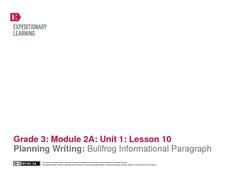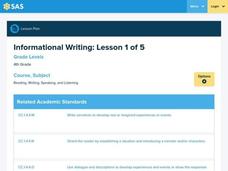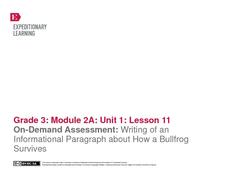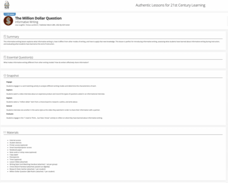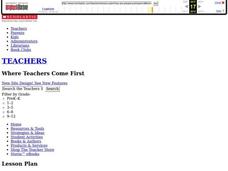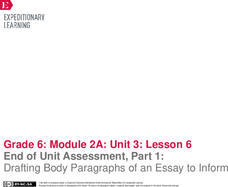EngageNY
Mid-Unit 2 Assessment: On-Demand Informational Writing
Lesson 7 focuses on building academic vocabulary and writing an explanatory letter with supported textual evidence. For the first five minutes of the lesson plan, the educator reminds the class of how to read and refer to the accordion...
EngageNY
Planning Writing: Bullfrog Information Paragraph
Lesson ten in this unit for the book Bullfrogs at Magnolia Circle, prepares third graders to begin writing an informational paragraph about the adaptations of bullfrogs. First, young writers work either independently or in pairs to...
EngageNY
Performance Task Preparation: Peer Critique and Mini-Lesson Addressing Common Errors: Revising Draft Essay to Inform
Time to revise! Using a writing evaluation rubric, scholars participate in a peer editing process to provide feedback on each others' informative essays. Next, pupils begin revising their drafts based on the feedback they receive.
Pennsylvania Department of Education
Informational Writing
Emerging writers identify an informational piece of writing. They are provided with examples of informational writing and view a PowerPoint on narrative writing. Then, they design their own informational writing with a brochure,...
EngageNY
On-Demand Assessment: Writing of an Information Paragraph About How a Bullfrog Survives
Having read and discussed Bullfrog at Magnolia Circle, third graders demonstrate their bullfrog expertise by writing informational paragraphs. Building on the note-taking and paragraph planning from the previous lesson plan, learners...
K20 LEARN
The Million Dollar Question: Informative Writing
Introduce high school freshmen to the characteristics of informative writing with a 5-day lesson that distinguishes informative writing from other modes. Scholars learn how to search for and cite reliable resources, then research and...
Education World
Take Five: Writing a Color-Coded Paragraph
Use a traffic light to model a very basic paragraph plan. The Go, or topic sentence, is written in green and expresses an opinion about the topic. Information that supports the opinion of the Go sentence is written in yellow and the...
EngageNY
Analyzing the Structure and Content of an Essay to Inform
Outlines are a great asset to essay planning. Scholars read and analyze a model essay about the importance of daily reading and consider how it would look in an outline format. Next, they outline their own informative essays about rules...
EngageNY
Mid-Unit 3 Assessment Part 2: Explaining How New Information Connects to the Topic
Take two! Scholars begin part two of the Mid-Unit 3 Assessment. They continue researching the destruction caused by the 1906
San Francisco earthquake and fires. To further their research, they discuss how new information connects to the...
Curated OER
Writing Classroom Agreements using Inspiration & Word to Go
How can you foster a thoughtful learning community for your class? First, the class brainstorms a list of behaviors that will help make the classroom a great place to learn. Then learners group similar ideas together and come up with...
Curated OER
Organizing by Writing
Middle schoolers analyze how to use writing for generating and organizing their thoughts before communicating them. They use the questions on the first handout to organize a three-minute introduction of themselves to their small group....
Curated OER
How are People Portrayed by Different Media?
Your 9th - 12th graders can hone their analysis and critical thinking skills by studying the way a subject is portrayed across media types. They examine how various print, visual, and online sources have portrayed key players in the 9/11...
K20 LEARN
Let Us Start The Lettuce Club (Or Not): Writing A Thesis Statement
Let us be frank! Writers learn that crafting a thesis statement is not that difficult if one peals back the layers. After watching several videos about the elements of a thesis, class members read the article "Lettuce Club helps students...
Curated OER
Working in your Cubicle: Critical Thinking and Writing
Explore informative and explanatory writing with this instructional activity. Using a cube labeled with directives to describe, analyze, compare, associate, apply, and argue the topic, middle schoolers work individually or in groups to...
Curated OER
How to Write a Biography
Looking for a great instructional activity on how to write a biography? Here, middle schoolers draw from magazine articles, novels, historical figures, and current events to choose a person, or character to write about in a biography....
EngageNY
End of Unit On-Demand Informational Writing: Philo Farnsworth’s Invention of the Television and How It Changed People’s Lives, Part 2
Scholars complete the unit by finishing their end of the unit assessments. They arrange sentences for an introductory paragraph in the correct order, provide evidence for their thinking, and write a conclusion paragraph. They then...
EngageNY
Grade 9 ELA Module 3, Unit 3, Lesson 3
Plagiarism is the theft of intellectual property. To avoid this crime, class members learn how to create a works cited page and how to craft in-text citations. After examining a high-performance model paragraph and an example of a works...
Prestwick House
Writing Arguments in Response to Nonfiction
Emotional appeal or argument? That is the question. An informative activity helps your class recognize the difference between a logical argument and an emotional appeal and learn how to craft an argumentative response. Writers develop a...
Curated OER
Writing Prompts for High School
Are you teaching a high school language arts class and stumped for writing topics? Five pages of writing prompts for all kinds of writing should help you out. Many of these prompts refer to texts that are not included in this resource,...
Curated OER
Writing Diagnostics and Introduction to Literary Terms
Assess your new learners' writing abilities and knowledge of literary terms with these diagnostic activities. Part of a back-to-school unit, this is meant to provide the teacher with information about the ability levels of their class....
Overcoming Obstacles
Writing Reports
Following a review of how to research and take notes, scholars define the term paraphrase and identify ways to organize information and finish reports. To put their newfound knowledge to the test, learners interview a peer, take notes,...
EngageNY
End of Unit Assessment, Part 1: Drafting Body Paragraphs of an Essay to Inform
Anybody can write a body paragraph! Pupils analyze the development of ideas in a body paragraph from a model essay. Next, using what they've learned, they draft the body paragraphs of their My Rule to Live By informative essay.
Curated OER
How to Locate and Evaluate Information, Part I - Online Catalog
Using the online catalog, researchers locate and record on a citation template specific sources for their research paper. A library specialist models searching strategies while the teacher introduces the research paper process. Daily...
Curated OER
Writing Prompts for High School
Here’s a great teacher resource - thirty-five writing prompts designed for high school writers. Categories include cause and effect, definition, expository/informative, persuasive, how to, descriptive, narrative, biographical narrative,...



